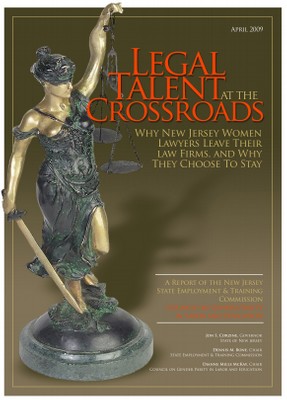Legal Talent at the Crossroads – Women Lawyers in New Jersey
New research from Rutgers’ Center for Women and Work finds that women lawyers are taking control of their lives by choosing employers that support flexible workplaces.
The report, “Legal Talent at the Crossroads: Why New Jersey Women Lawyers Leave their Law Firms and Why They Choose to Stay,” relies on survey data from female lawyers and women who have left the profession.

The report was sponsored by the Council on Gender Parity in Labor and Education of the New Jersey State Employment and Training Commission. The Center for Women in Work is part of Rutgers’ School of Management and Labor Relations.
The researchers used a confidential online survey that focused on factors contributing to success and attrition, as well as choices regarding work/life balance. Researchers also held focus groups with women lawyers and conducted individual interviews.
Almost two-thirds of respondents indicated they were satisfied with their ability to integrate their work and personal lives and the predictability of their hours. Yet while many women were satisfied with the compensation, professional autonomy, job security, and recognition they received from their employers, other women expressed frustration with the biases they felt were still present.

The data point to several reasons for respondents’ dissatisfaction with their former employers, including an unsupportive work environment, poor promotion opportunities, and issues related to work/life balance.
An important new finding of this study is that women lawyers often choose an exit strategy when faced with the dilemma of choosing between work and family obligations. Many respondents left their former employers due to a lack of flexible work arrangements and chose new employers based on whether they offered access to those arrangements.
Of the respondents who changed employers in the last five years, more than 70 percent indicated their former employer was not supportive of full-time flexible alternatives, whereas only 30 percent described their current employer as unsupportive of such arrangements.
Many women lawyers who made it to the top of the profession cited the importance of role models and mentors. Some felt that their firms were supportive in their quest for work/life balance, while others felt they succeeded in spite of their firms’ lack of support in that area.
The report also presents steps New Jersey firms can take to retain and advance women lawyers, including providing flexible work arrangements.